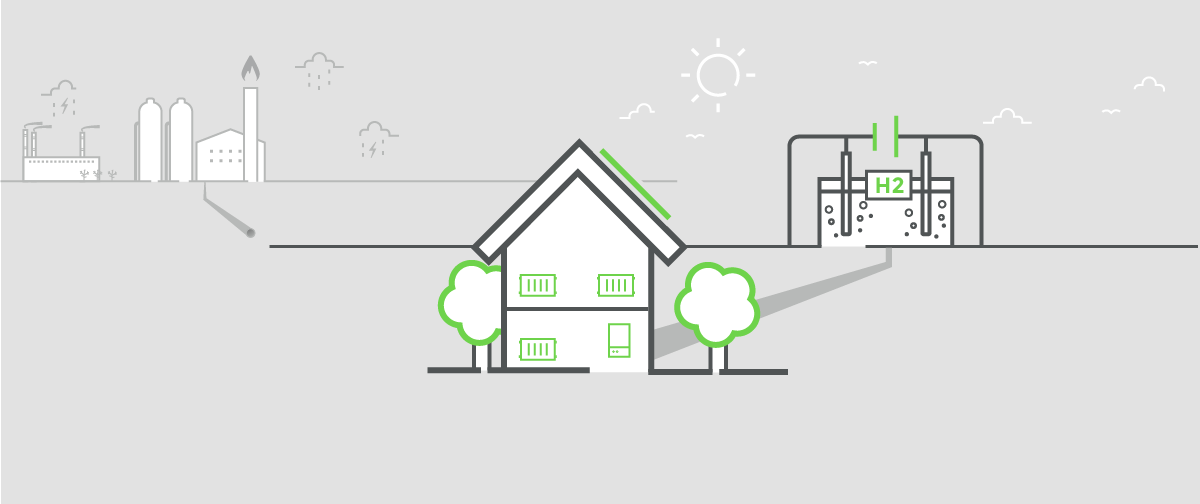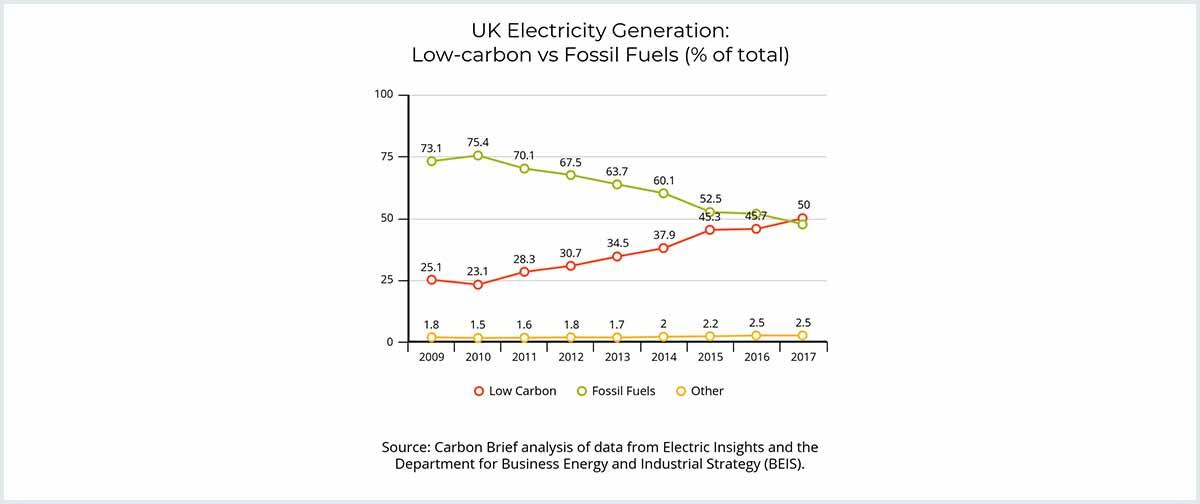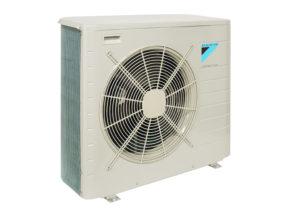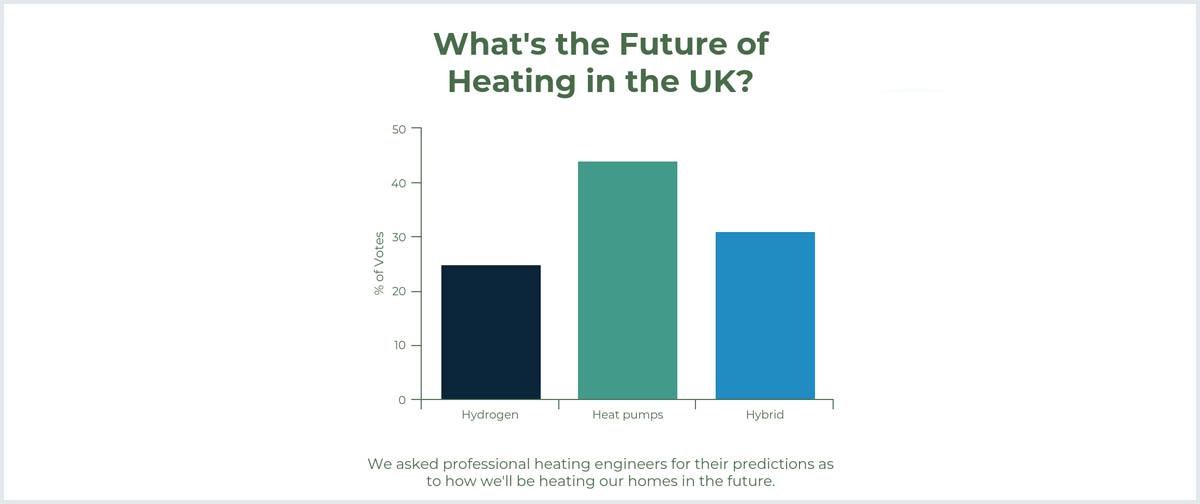Low-carbon Heating: Heating Systems of the Future

Low carbon heating systems will have a huge role to play if the UK is to achieve its carbon reduction targets.
Gas central heating is installed in the vast majority of properties but burning gas emits carbon into the atmosphere. As a result, low carbon heating systems, such as heat pumps and solar thermal panels will have to be part of the future of heating.
What are low carbon heating systems?

A low carbon heating system releases little to no carbon into the atmosphere as it works to heat the home. This is contrary to conventional gas and oil boilers which increase the levels of carbon in the atmosphere.
Rather than burning fossil fuels, low carbon heating systems – or renewable heating systems – extract heat from sustainable sources. These sustainable sources include the sun, the ground, plant-based organisms and even the air outside.
These fuel sources are sustainable because the supply will continue to be replenished. Supplies of fossil fuels, on the other hand, are already running dry.
Some examples of renewable heating systems that could be installed into your home include:
At the time of writing (2018), only 1 million of the 27 million homes in the UK have a low carbon heating system.
While the uptake of low carbon heating systems in domestic settings is relatively slow, electricity generation is increasingly green. In 2017 more electricity was generated from renewable sources than from fossil fuels in the UK for the first time.

Why switch to a low carbon heating system?
For hundreds of years we've been powering our homes, transport and industry with fossil fuels like natural gas, oil and coal. While these fuels have enabled us to take huge steps forward both economically and technologically, we can't go on using these fuels forever. Not only are our supplies running out, but the long term environmental impact on our climate is now an urgent and international concern.
In 2019, the UK government put into law that as a nation our carbon emissions will be at net zero by 2050. Net zero is the act of balancing out our carbon emissions through offsetting or carbon capture. This is different to 'zero carbon' which would mean that no carbon is emitted whatsoever.
To achieve net zero carbon emissions by 2050 the amount of carbon we're currently producing as a nation must be significantly reduced. And around 14% of all UK carbon emissions come from home heating.
So we need to make big, long term changes to the way we power and heat our homes, but with minimal up-front costs and lower ongoing energy bills.
The answer? Low carbon heating systems.
As well as being able to lower the carbon emissions of the UK as a whole, low carbon heating systems will benefit individual homeowners in a number of ways too.
Benefits of low-carbon heating
- Reduce or end any reliance on your energy supplier
- Save a considerable amount on your home heating bills
- Potentially receive payments through Government renewable heating incentives
Choosing a low carbon heating system
There's no shortage of options when it comes to choosing a renewable heating system and, depending on your property, one type of renewable heating system is likely to be more suitable than another. Renewable heating systems include:
- Air source heat pumps
- Ground source heat pumps
- Water source heat pumps
- Solar thermal heating panels
- Hybrid heating systems
- Biomass boilers
- Micro CHP boilers
We're going to take you through each of these individually to help you choose a suitable low carbon heating system.
Heat pumps

There are 3 different forms of heat pump available for domestic installation: air source, ground source and water source. Each form of heat pump is able to produce central heating and domestic hot water by extracting heat from one of 3 sources – the air, ground or water.
When it comes to heat pumps versus gas boilers, heat pumps require electricity to operate but are able to produce 3-4 times as much energy as they use. This means they can reach efficiency levels of 400%. The most efficient gas boilers are around 93% efficient.
While they are incredibly efficient heating systems, they're unable to produce heat to the same temperature as a gas boiler. For this reason, they're best suited to heating systems that include underfloor heating or large radiators. You will also need to ensure that your property is well insulated.
Air source heat pumps

An air source heat pump is likely to be the most suitable form of heat pump for the vast majority of households. This is because they are the least disruptive when it comes to the installation.
As with all heat pumps, some outdoor space is required for the installation of an air source heat pump. This is for a unit that includes a fan that turns to bring in the air and is no bigger than a typical washing machine.
There are two types of air source heat pump: air-to-water and air-to-air systems. An air-to-water heat pump generates hot water that can be circulated around a wet central heating system. Air-to-air systems, on the other hand, heat the property with fans that can also provide cooling during the summer – like air conditioning.
Find out more about air source heat pumps.
Ground source heat pumps
A ground source heat pump requires a fair amount of garden space as a pipe network needs to be installed underground. A refrigerant liquid is circulated through these pipes – which can be installed horizontally or vertically – and absorbs underground heat which remains at a constant temperature of between 10°C and 15°C.
Once it's been warmed up, this liquid travels to a heat exchanger where it's heated further before it provides central heating.
Find out more about ground source heat pumps.
Water source heat pumps
If you live within a few hundred metres of a river or lake then you have the additional option of a water source heat pump. Throughout the day, outdoor water is absorbing heat from the sun and with a water source heat pump, this heat can be extracted to provide central heating for your property.
Taking heat from water rather than the air or ground comes with a number of advantages:
- Able to produce more heat annually than air source heat pumps
- More heat is contained in water than air during the winter months
- Heat from water is transferred faster than from the air or ground
Find out more about water source heat pumps.
Solar thermal heating panels
In many ways solar thermal is similar to solar PV, but rather than turning the sun's energy into electricity this system uses it to heat your water. This solar heated water can supply a wet central heating system as well as your taps, baths and showers.
By using the sun's free energy to heat your water you will need to use your boiler less. This means cheaper heating bills, lower carbon emissions and less strain on your boiler.
- Solar thermal panels (also known as collectors) are fitted to your roof. The panels include tubes of fluid which absorb heat from the sun's energy.
- This hot fluid travels down into your home and the heat is transferred to your hot water storage tank via a heat exchanger.
- This hot water then travels around your pipes as it would in a standard wet heating system.
Find out more about Solar Thermal Heating.
Note: If you have an electric heating system or an immersion heater then solar PV panels will generate electricity for these systems.
Hybrid heating systems
A hybrid heating system is a combination of a traditional boiler with an air source heat pump. This technology is a particularly good option for homeowners looking to keep the familiarity of the boiler we all know so well but with the energy saving benefits of a renewable technology.
The hybrid heating system will automatically switch between the heat pump and boiler depending on which will deliver the most efficient performance at any given time.
Biomass boilers
![]()
Biomass boilers work in a similar way to gas and oil boilers. However, rather than burning fossil fuels they burn biomass materials such as wood logs, chips and pellets.
Burning wood is a carbon neutral process which means it only produces as much carbon dioxide as the tree absorbed while it was growing, cancelling itself out. As a naturally occurring fuel, it is much more sustainable that the likes of coal. Unlike coal, wood does not take millions of years to form. In addition, UK landfill sites take in millions of tonnes of waste wood every year. This means that using wood as fuel is not only healthier for the planet's atmosphere but will also take the strain off our landfill.
Depending on the model, a biomass boiler will either operate manually or automatically. A manually-fed biomass boiler will require you to feed the fuel into the boiler yourself. An automatically-fed biomass boiler, on the other hand, has a hopper which takes care of feed the biomass fuel into the boiler as and when needed.
Find out more about Biomass Boilers.
Micro CHP boilers
Micro combined heat and power (CHP) boilers are the only low carbon heating system in this list that isn't also a renewable heating system. This is because they currently rely on natural gas or LPG as fuel. Having said this, they can also be powered by a hydrogen fuel cell.
Another difference between micro CHP boilers and the other heating systems in this list is that they also provide electricity. In fact, electricity is its primary output with heat being a byproduct of the electricity generation process. Despite heat being a secondary product of its operation the end result produces around 6 times more heat than electricity.
Even though natural gas is the primary fuel for a micro CHP boiler, replacing a gas boiler with one could still help to lower the carbon footprint of your property.
Low carbon heating installation costs
Compared to gas and oil boilers, which can be purchased and installed for around £4,0001, a renewable heating system is likely to cost at least £6,000. With prices stretching right out to £21,000 for an automatic biomass boiler.
| Low Carbon Heating System | Potential Cost (including installation) |
|---|---|
| Air source heat pump | £6,000 – £16,000 |
| Ground source heat pump | £14,000 – £19,000 |
| Water source heat pump | £10,000 – £12,000 |
| Solar thermal panels | £3,000 – £7,000 |
| Hybrid heating system | £5,000 – £10,000 |
| Biomass boiler | £4,000 – £21,000 |
| Micro CHP boiler | £10,000 – £15,000 |
These figures are just an estimate, to get an accurate quote for your property simply click the link below.
With low carbon heating systems, it's important to not only consider the upfront costs but the long term savings you could be making too.
| Low Carbon Heating System | Heating Bill Savings | Carbon Savings (CO2 per Year) |
|---|---|---|
| Air Source Heat Pump | Up to £1,300 | Up to 10.5 tonnes |
| Ground source heat pump | Up to £1,090 | Up to 10.6 tonnes |
| Solar thermal panels | Up to £100 | Up to 0.6 kg |
| Biomass boiler | Up to £980 | Up to 11.1 tonnes |
Grants for low carbon heating systems

To help homeowners with the upfront costs attached to low carbon heating systems, the UK government has launched the Boiler Upgrade Scheme.
This scheme will offer grants which cover up to as much as £6,000 towards the cost of the full installation. The renewable heating systems covered by the scheme include:
- Air source heat pumps
- Ground source heat pumps
- Biomass boilers (in specific circumstances)
You can find out more about the scheme on our Boiler Upgrade Scheme page.
Low carbon heating systems clearly hold a lot of answers for the future of heating. However, replacing all gas boilers with renewable heating systems would be impractical and expensive.
In the UK we have an extensive gas network which, according to the National Grid, is connected to 8/10 homes. That's 80% of UK homes receiving a supply of natural gas to fuel a gas boiler.
To transition these properties into a low carbon future it could make more sense to replace the fuel rather than the heating systems. One possible solution is to replace natural gas circulated around the gas network with hydrogen.
Speaking about the potential of hydrogen as a fuel for home heating, Lord Deben, Chairman of the Committee on Climate Change (CCC), said:
Hydrogen has the potential to contribute to near-zero carbon energy emissions if used strategically. The Government must now decide whether it wishes to develop a UK hydrogen option, taking decisions now that will see the first deployment in the 2020s. This must be in parallel with efforts to improve energy efficiency, build further low-cost renewables and get carbon capture and storage underway. The time for the Government to move from theory to practice has arrived [...] The future now rests on Government making a quick decision and fully committing to low-carbon heat within the next three years.

Advantages of hydrogen network
Leading boiler manufacturers Baxi and Worcester Bosch have both already developed their own hydrogen-ready boilers. These units can operate on natural gas but are also ready for a switch to 100% hydrogen. As well as developing hydrogen heating technology, there are calls from these manufacturers for all boilers installed from 2025 onwards to be hydrogen-ready.
It's clear to see why boiler manufacturers are turning their attention to a future of heating which includes hydrogen as there are a number of benefits.
We could use the existing gas network
Possibly the greatest reason for pursuing hydrogen as a fuel for heating is that we could continue to use the gas network yet still lower carbon emissions. It would also remove the need for homeowners to familiarise themselves with new heating technology.
Produces low or zero carbon emissions
Burning fossil fuels such as gas and oil, as the majority homes currently do, produces carbon which is released into the atmosphere. The process of burning hydrogen, on the other hand only creates heat and water. No carbon whatsoever.
A more efficient fuel than natural gas
Hydrogen is a much more efficient fuel than gasoline. This means that your home could be heated just as well but with less fuel. The same amount of energy is contained in 1kg of hydrogen as 2.8kg of gasoline.
Sustainable supply
Hydrogen surrounds us so we have an ever present supply that we wouldn't run short of any time soon.
Challenges of hydrogen network
On the face of it, hydrogen sounds like the perfect solution. However, there are some challenges that would need to be addressed.
Production is currently expensive
There are 2 ways of producing hydrogen: electrolysis or Steam Methane Reforming (SMR).
Electrolysis is the process of splitting water into its individual components (hydrogen and hydrogen) using an electric current. If the electricity provided is generated by renewable sources then this is the greenest form of hydrogen production.
The alternative is Steam Methane Reforming which is the process of reacting steam with methane. As well as generating hydrogen, STR does produce carbon. Rather than the carbon being emitted into the atmosphere, it can be captured thanks to Carbon Capture Storage (CCS).
Both of these processes are currently expensive and will be needed to produce high amounts of hydrogen to meet demand.
Storage is potentially problematic
As a result of being much lighter than natural gas, hydrogen is difficult to store and transport. To store it successfully, it needs to be converted into a liquid and kept at a low temperature.
Highly flammable
As a result of holding so much energy, hydrogen is very flammable and leaks can be hard to detect as it doesn't have a smell. For this reason, sensor alarms would need to be installed in all properties.
Read more about hydrogen being part of the future of heating:
- Advantages and Disadvantages of Hydrogen Energy
- Hydrogen: An Alternative to Gas Central Heating?
- Is Switching to Hydrogen a Viable Option?
Future of off-grid heating systems
While the future of heating for homes connected to the gas network remains uncertain, off-grid properties could be closer to a low carbon future.
The government has talked of replacing oil, coal and LPG heating systems with renewable energy alternatives by as soon as 2025. There are no concrete strategies in place, but the government's Clean Growth Plan states: "Our ambition is to phase out the installation of high carbon fossil fuel heating in new and existing off-gas grid residential buildings (which are mostly in rural areas) during the 2020s."
However, the UK's trade association for oil fired appliances, OFTEC (Oil Firing Technical Association), argues that replacing oil boilers is not the solution for off-grid homes.
In May 2020, OFTEC unveiled a strategy for the future of off-grid heating in A Strategy for Decarbonising Oil Heated Homes. They believe that oil can be replaced by a complete renewable liquid fuel by 2035:
- Stage 1 by 2027: 30% blend of biofuel and 70% kerosene
- Stage 2 by 2035: 100% renewable liquid fuel
OFTEC believes that this strategy will address carbon reduction and energy efficiency simultaneously and means that homeowners won't have the high upfront cost of replacing an entire heating system. In addition, replacing the fuel rather than the boiler will mean there will already be a network of engineers and suppliers in place to support the transition.

Quotes for low carbon heating systems
Keeping the costs of a low carbon heating system to a minimum will be a high priority for many homeowners. And the best way to do that is by comparing quotes from at least 3 installers.
Using Boiler Guide, you can get free quotes from up to 3 renewables installers who work in your local area. We have a network of installers right across the UK who are qualified to install air source heat pumps, ground source heat pumps and biomass boilers. All you have to do to connect with them is tap through our simple online form.
Interested in solar thermal? Visit Solar Guide to get free no-obligation installation quotes.
Reference
- Energy Saving Trust, Heating your Home: Boilers (2022)



